The Caribbean Development Bank has approved a project that aims to increase the use of technology to build greater climate resilience throughout the region.
Funded through a grant of US$1.5 million and to be executed by the Caribbean Community Climate Change Centre (CCCCC) over a three-year period, the project approved on Monday will support flight-mapping services to collect Light Detection and Ranging (LiDAR) data for almost 10,000 square kilometres of vulnerable Caribbean coastal areas.
LiDAR is a remote sensing technology used to obtain highly accurate elevation measurements of the earth’s surface. LiDAR technology is capable of simultaneously gathering both topographic and bathymetric data, which are used to provide detailed information of land and ocean floors, and offer economies of scale.
The grant provides resources for the preparation of an Intellectual Property Policy (IPP) and the creation of a product development and marketing strategy for the Centre, as well as the training of 38 end-users from the Bank’s Borrowing Member Countries (BMCs) in the applications of LiDAR data.
“Generating quality scientific data and information products, data sharing, and ease of data access and transfer, are important aspects of building climate resilience across the region because they support an improved understanding of climate risks and impacts,” said Daniel Best, Director, Projects Department, CDB.
The LiDAR project will enable CDB’s Borrowing Member Countries to acquire high-resolution coastal and bathymetry datasets at significantly reduced costs, compared with commercial sources. Currently, progress with these activities is being hampered by the absence of quality spatial datasets, which are often project-specific and provide limited data documentation methodology. Moreover, the cost of acquiring high quality datasets is expensive—a factor that constrains routine updating.
The project fills an important gap in efforts to design new climate-resilient investments, retrofit existing infrastructure, support coastal zone management, identify natural hazards and formulate disaster risk management strategies throughout the region.




